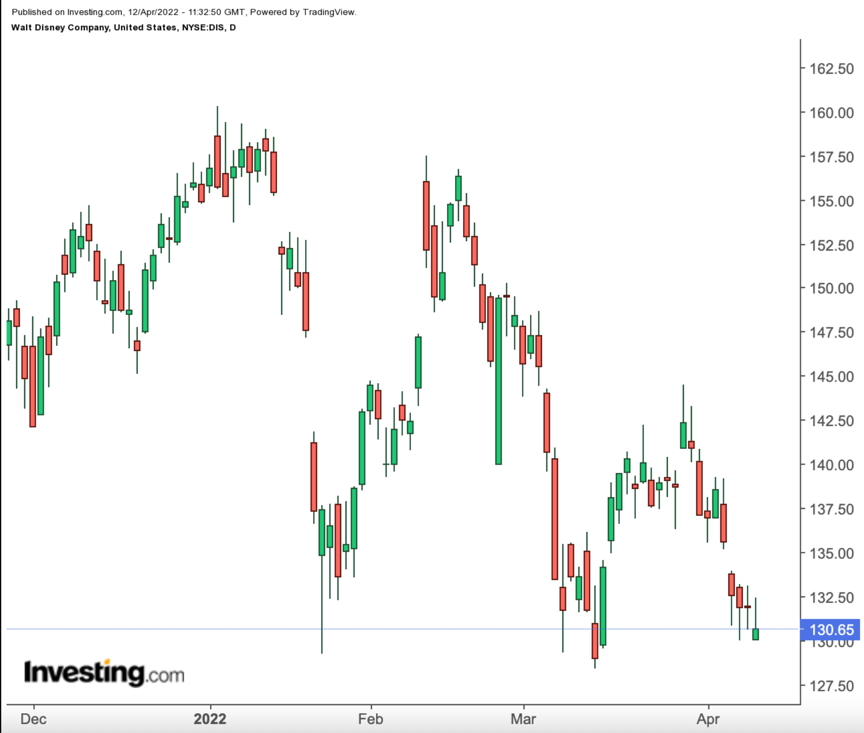This article was written exclusively for Investing.com
It's been quite a while since Disney (NYSE:DIS) stock was a good investment.
Over 1-, 3-, 5- and 10-year periods, shares of the entertainment giant have lagged the S&P 500 (though the decade-long underperformance admittedly is minimal). Including dividends, the stock has returned just 21% over the past five years, or roughly 4% annualized.
The simple explanation for the relative weakness focuses on two areas: streaming and its parks business.
Disney was simply late to streaming. The company allowed Netflix (NASDAQ:NFLX) to gain dominant market share; it wasn't until November 2019 that the company finally launched Disney+. The parks business, meanwhile, was hammered by restrictions related to the coronavirus pandemic, and only recently has regained its footing.
In addition, investors—and particularly bulls on Disney stock—too often ignore another key problem: Disney's media empire. Stagnant growth in that business has weighed on the stock price for years now. There's a strong possibility that pressure will continue in the future also.
The Importance of Television to Disney Stock
Disney's television empire is vast. Domestically, the company controls Freeform, FX, the National Geographic channel (of which it owns 73%), A+E (a 50% stake) and ABC. Internationally, the company operates Disney, Fox, National Geographic, and Star.
The most important network globally, however, is its sports-focused ESPN. Particularly in the US, the sports network had one of the best business models in any market, not just media. Affiliate fees—paid by distributors for the right to carry a network—for ESPN and ESPN2 totaled nearly $9 per month in 2020.
That's more than $100 per year, per subscriber—whether that subscriber watches either network or not. Both networks generate plenty of advertising revenue as well.
As a result, ESPN is far and away the crown jewel of Disney's media business. And that business is absolutely key to the company's profitability. In fiscal 2021, according to the Form 10-K filed with the US Securities and Exchange Commission, the Linear Networks group (i.e., Disney's television networks) generated $8.4 billion in operating profit. Streaming lost $1.68 billion; Parks, Experiences & Products generated less than $500 million.
Obviously, the streaming strategy and the pandemic (which also has hit Disney's studio business) are pressuring earnings in the rest of the business. But even in fiscal 2019, Cable Networks (Disney restructured its reporting last year) accounted for more than 36% of total segment-level operating earnings. ESPN, no doubt, accounted for the lion's share of that profit.
The ESPN Problem
The problem is that those profits are going to decline. In FY2021, affiliate fee revenue for Disney as a whole was flat year-over-year. The figure declined 1% year-over-year in the first quarter of this fiscal year.
Yet, ESPN's costs are rising, a key reason why operating income for the Linear Networks segment dropped 11% last year and another 13% in Q1.
It's difficult to see how these problems get fixed. The 'cord-cutting' trend is a clear threat to ESPN; in fact, the affiliate fees the network requires are part of the reason why cable and satellite fees have soared over time. Disney has launched ESPN+ to drive direct-to-consumer revenue; but the fees for that service are lower than the affiliate fees generated from cable, satellite, and virtual distributors like FuboTV (NYSE:FUBO).
Even if the streaming, parks, and studio businesses recover, there will be an offsetting headwind from the television businesses. The likes of ABC and FX face similar challenges, even if those challenges aren't nearly as material to the overall bottom line.
Can Disney Stock Recover?
To be sure, a recovery outside of ESPN means Disney earnings are likely to grow over time, but that alone doesn't make Disney stock a buy.
After all, even down sharply from the highs, the stock already is pricing in growth. The consensus Wall Street estimate for fiscal 2023 (i.e., next year) EPS sits at $5.25. DIS stock trades at nearly 25x that figure.
It's going to take time for Disney to get back to past highs. After all, the most recent quarter outside of television was strong. Disney+ subscribers topped expectations. Management still sees the base potentially doubling, to 260 million, by the end of 2024. The parks business got back to profitability in fiscal Q1 as well.
Yet, Disney earned barely $1 per share in the quarter. It's on track to earn $4-plus this year. That's not enough. Much more in the way of growth is needed.
The political controversy in which the company finds itself in Florida is a potential near-term headwind, certainly. But assuming, as is likely, that the news cycle moves on, the long-term headwind from the TV business remains.
If ESPN, in particular, proves a drag on growth in coming years, it's going to be difficult for Disney to grow enough to support even this lower share price. It's hard to see how Disney keeps ESPN profits from falling. And in that scenario, even down 31% from the highs, DIS stock might not yet be cheap enough.
